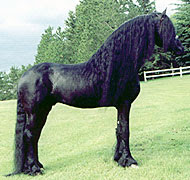As the name suggests, the Friesian
Horse comes from Friesland in the Northern Netherlands. It is assumed that the
breed came from the primitive forest horse. The Friesian has a known history of
400-600 years.
The Romans took the Friesian horse to
England, and it might have influenced other horse breeds, including the Shire
Horse, Clydesdale, Fell pony, and Dale pony.
In the Middle Ages, the horse was
used to carry the Knights, who had heavy armour, into battles because of the
Friesian's size and strength. A suit of armour could weigh well over 100
pounds. The horses' stylish appearance might have influenced the knights'
decision to use them, also.
In the 12th and 13th century, through
the crusaders, the eastern horses were mated with the Friesians. From the15th
century until the 17th century, when the Netherlands linked with Spain, the
demand for heavy war horses decreased as the battle armour changed. Andalusian
blood was added to lighten the weight, and they became suitable for work as an
urban carriage horse.
Friesian horses were also used in
France and Spain by high dressage schools. They are still popular for their
gentle temperament and their graceful appearance. Friesians have glossy black
coats and long, wavy manes and tails. They have a pronounced high-stepping gait
that is especially noticeable at the trot. These handsome mounts have long
necks, expressive eyes, and small ears.
There are two basic types of Friesians
- the baroque and the modern. Baroque Friesians have the typical body type of
the original breed, with heavier bone and more substance. The modern Friesian
is more of a sports horse, with more refinement and more height than its
heavier cousin. With their beautiful heads, powerful bodies, and graceful
movement, Friesians are gaining popularity in the United States, as well as in
Europe. They can often be seen in the show ring, especially in dressage
competitions. By doing a quick search on the internet for "Friesians for
sale," you'll see that these horses are often very expensive.


No comments:
Post a Comment